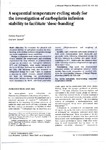A sequential temperature cycling study for the investigation of carboplatin infusion stability to facilitate dose-banding

Date
2007Author
Subject
Metadata
Show full item recordAbstract
<jats:p> Study objective. To determine the physical and chemical stability of carboplatin infusion for dosebanding, with cycling between refrigerated storage and room temperature in-use conditions. </jats:p><jats:p> Design. A sequential study design was selected to closely simulate the temperatures and conditions experienced by drug infusions in pharmaceutical storage and in clinical use. Carboplatin infusions, 0.70 and 2.15 mg/mL, were stored refrigerated for up to 84 days, followed by incubation at 258C for 24 h. The infusions were also returned to refrigerated storage for 3 and 7 days, to replicate a situation in which returned, unused infusions are kept for re-issuing. On pre-determined time-points, infusion chemical and physical stability were determined by HLPC, sub-visual particulatecounts, pH-measurement, and weighing of infusions. </jats:p><jats:p> Results. Light protected carboplatin infusions at both study concentrations were chemically and physically stable following refrigerated storage for 84 days, followed by a further 24 h under ‘in-use’ conditions at 258C. Additionally, the infusions were stable following return to refrigerated storage again for at least 7 days. </jats:p><jats:p> Conclusion. This study has demonstrated extended stability of carboplatin infusions which enables batch-scale preparation of standard infusions for dose- J Oncol Pharm Practice (2007) 13: 119–126. </jats:p>
Collections
Publisher
Place of Publication
Journal
Volume
Issue
Pagination
Author URL
Recommended, similar items
The following license files are associated with this item:

